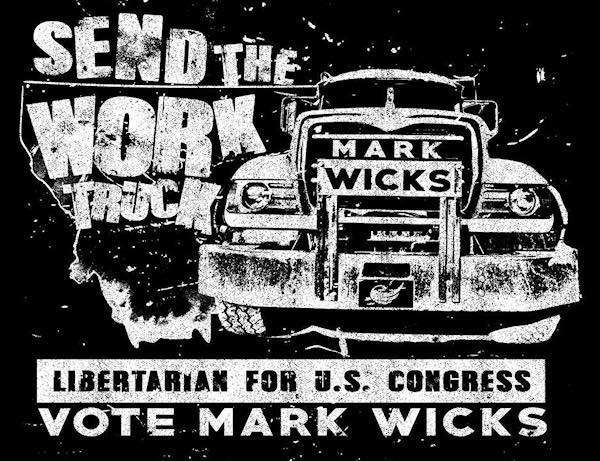Montana Libertarian Mark Wicks, Who Got 6 Percent Against the GOP's Gianforte, Believes the L.P. Must Focus More on State and Local Races
It wasn't ultimately surprising that a Republican candidate facing assault charges for allegedly bodyslamming a reporter the day before the election won his House race in Montana anyway. But Greg Gianforte's 6 percent win over Democrat Rob Quist was far lower than most assessments of Montana's relative preference for Republicans would indicate. And Gianforte's winning margin was exactly matched by the unprecedented 6 percent total for a Montana House race for the Libertarian Party's candidate, Mark Wicks.

Wicks, a rancher and mailman in Inverness, Montana, thinks the key to his unusually good results for the L.P., for a campaign that could not afford any print, TV, or radio ads and only a few signs, was that the L.P. helped pressure the hosts of a televised debate to include Wicks along with his major party competitors.
"When people saw how I handled myself, especially compared to the other two," Wicks said in a phone interview the day after the election, it helped him nearly double the last L.P. House candidate's 3.3 percent. (In Liberty County, next door to his home county, where Wicks says he likely personally knows one-quarter of the voters, he pulled 16 percent.)
He credits his good showing in the debate not so much to ideology, but to the fact that he was able "to answer questions in a straightforward and honest way. My answers were consistent but [voters] could tell they weren't memorized. I would answer the question asked and not just pivot to a talking point."
Wicks expects he'll run for office again, though not sure exactly what office or when. He'd like to have more money, sooner whenever that happens. He'd like to be in a better position to hit the ground running with a decent cash pile the way major party candidates usually can.
The Libertarian National Committee (LNC) did give him a rare donation of $5,000, but it came too late in the process to do much good, Wicks says. Wicks sees the LNC faced a chicken and egg dilemma—he understands their reluctance to hand over a pile of cash to an untried candidate until after the debate showed he could comport himself well and make a decent run of it, but getting the money within the last couple of weeks before the election gave him no chance to have it serve as seed money for outreach that could have lead to more money.
His campaign was able to spend "a couple thousand" on Facebook advertising, he says, but his jobs and the vast sprawl of Montana's one-district state made in-person appearances before crowds of voters also impossible. He lives about 300 miles from any major Montana city.
Most of his volunteer support came via the Feldman Foundation, a national organization dedicated to finding and helping liberty-oriented candidates (named after Marc Feldman, a deceased former Libertarian Party activist and presidential aspirant). Wicks credits them with a "tremendous job, it took so much weight off my back." They managed his press releases and phone banks, for which he recalls one activist personally made 3,000 calls.
"I've always been a very conservative Republican, very freedom oriented," Wicks says. But "I felt the Republican Party just left me. The Patriot Act, the Military Commissions Act, their budgets…they run on cutting spending and don't cut spending." He won the L.P.'s nomination against seven other candidates at a state Party convention. He knows that many in the Party "are upset that I'm not hardcore libertarian enough for them. But we have to realize we have to start in increments. We can't start with hardcore libertarianism."
At least some voters thinking about him, he says, would "read the L.P. platform and decide they didn't want to vote for me because it goes too far, a little too much freedom in it for their comfort." For example, he stresses that while he campaigned on marijuana legalization, he does not support the legalization of harder drugs. "Legalizing all the drugs is not going to fly in Montana."
Wicks also thinks it's likely he got votes based on what he found was a widespread hate for Gianforte and Quist partisans' attacks on each other. Given the overlap on constitutional and free-market rhetoric between Republicans and Libertarians, it's usually the GOP who insists the L.P. is "stealing" their vote. But Wicks says Democrat Quist's fans were messaging him accusing him of having stolen votes from Quist. Wicks thinks it's more likely that a would-be Libertarian voter was scared toward Gianforte for a greater fear of the Democrat winning.
What lessons does he see for the L.P. in his result? He thinks more, and more active, county affiliates are important for candidate services such as setting up events. And he thinks the Party should aim its resources and attention in general more at state or local races and less on the "pie in the sky" of national presidential runs. "That money could be put to a lot better use for other candidates."
He reminds the L.P., and himself, that given that this was a special election and another House race looms in 2018, that "we're nine months away from having to start waving signs around again, and it's hard to build up a Party in that amount of time."


Show Comments (59)